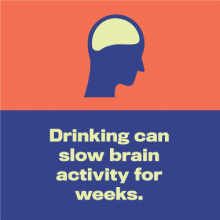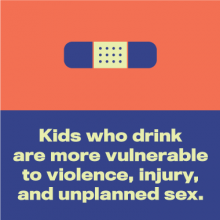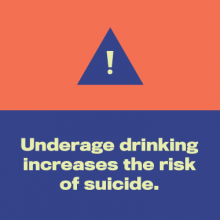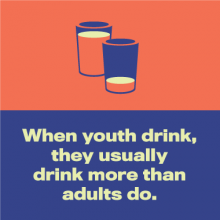
Why should you talk to kids about alcohol? Underage drinking is a real problem in Wisconsin, and it starts earlier and can be more dangerous than you might think. But parents, loved ones, and other caring adults can make a real difference. All you have to do is talk. That’s right. Having small, casual conversations with kids, starting around age eight, can help prevent underage drinking.
Know the consequences
There’s a reason the legal drinking age is 21. It’s to keep our children healthy and safe. When youth drink alcohol, they can damage and even block the development of healthy mental pathways in the brain that shape how kids feel, learn, behave, and grow. Damage like that can have lifelong physical, social, and emotional consequences.

Alcohol affects young people more powerfully than it does adults, and drinking before the brain and body are fully developed can have dangerous effects.
- Underage drinking can change the way the brain develops and functions.
- Alcohol can shut down new brain cell growth.
- Drinking can damage the parts of the brain responsible for learning, memory, and self-control.
- Alcohol can alter a child’s motor skills.
- High levels of alcohol in the body can shut down those parts of the brain that control breathing, heart rate, and body temperature.
- Heavy alcohol use can increase the risk of liver disease, heart disease, and seven different cancers later in life.
Young Drinkers Can Take Costly Risks

Underage drinking has serious consequences for a young person’s life, affecting everything from their behavior and relationships to their long-term health.
- 17% of kids who drink have been in a car with a driver who’d been drinking alcohol.
- There’s always a risk that substance use may lead to addiction.
- Drinking can lead to issues at school, with friends, and with the law.
- In the U.S., alcohol landed 119,000 underage drinkers in emergency rooms in 2013 alone.
- Underage drinking is associated with a higher risk of physical and sexual assault.
Alcohol is linked to mental health problems

As young people transition from childhood to adolescence, they experience dramatic social and emotional changes. Adding alcohol to the mix can be devastating.
- Underage drinking often goes hand-in-hand with higher rates of depression, anxiety, and suicide.
- Each year, about 300 young people die in alcohol-related suicides.
- Research shows that waiting to start drinking alcohol is one of the most effective ways to prevent the development of a substance use disorder later in life.
- Underage alcohol use is associated with youth who struggle with mental illness.
Most underage Drinking is binge drinking

Loosely defined as having four or five drinks in just two hours, binge drinking is especially dangerous for children.
- Around 90% of underage drinking is binge drinking.
- Because most underage drinking is binge drinking, young people are more likely to experience alcohol poisoning.
- Youth don’t drink as often as adults do, but when they have access to alcohol, they usually drink more than an adult would.
- Binge drinking lowers inhibitions at a time when young people are already eager to take risks.
Small Talks: Start Talking, It Makes a Difference
Think kids won’t listen? Think again. Research shows that parents and other caring adults are the most powerful influence on children’s choices about underage drinking. That means you can make a real difference, especially if you start early. Don’t worry; it’s easier than you may think. We can show you how.
Download this Small Talks Tip sheet and visit SmallTalksWI.org for more information.
“Small Talks: How WI Prevents Underage Drinking”
Source: Wisconsin Department of Health Services.
https://www.dhs.wisconsin.gov/ . Accessed April 21, 2020.